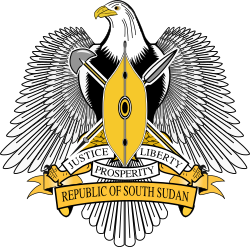| President of the Republic of South Sudan | |
|---|---|
 Presidential Seal | |
 | |
| Style | His Excellency |
| Type | Head of state Head of government |
| Member of | Cabinet |
| Residence | State House, Juba |
| Seat | Juba |
| Appointer | Direct popular vote |
| Term length | Four years [1] |
| Constituting instrument | Transitional Constitution of South Sudan |
| Precursor | President of the Government of Southern Sudan |
| Formation | 9 July 2011 |
| First holder | Salva Kiir Mayardit |
| Deputy | Vice President of South Sudan |
| Salary | SSP 45,922,800 / US$60,000 annually [2] |
| Website | www |
 |
|---|
| Constitution |
This article lists the heads of state of South Sudan since the establishment of the Southern Sudan Autonomous Region within Sudan in 1972.
Contents
- History of the office
- Term limits
- Titles of heads of state
- Heads of state of South Sudan (1972–present)
- Southern Sudan Autonomous Region (1972–1983)
- Southern Sudan Autonomous Region (2005–2011)
- Republic of South Sudan (2011–present)
- Timeline
- Incoming election
- See also
- Notes
- References
- External links
The president of the Republic of South Sudan is the head of state and head of government of South Sudan. The president leads the executive branch of the Government of South Sudan and is the commander-in-chief of the South Sudan People's Defence Forces. The official residence of the president is State House, J1.







